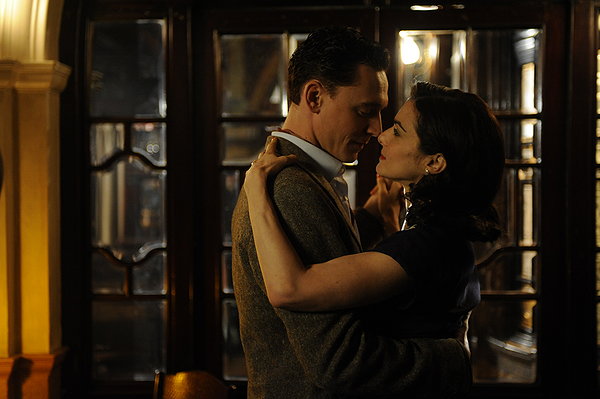Review: The Deep Blue Sea (2011)
Terrence Davies’ The Deep Blue Sea is an impressionistic examination of a woman and her lovers in the context of post-war Britain. Set “Around 1950”, it offers a lyrical portrait of a woman who has followed her passion rather than remain content with a “guarded enthusiam.” Hester, aka Lady Collyer, (Rachel Weisz) has left her husband, the judge Sir William Collyer (Simon Russell Beale), and taken up with Freddie Page (Tom Hiddleston), a dashing RAF pilot, now out of work and pursuing his passion in drink. A further crisis is precipitated when Hes attempts to take her own life and William and Freddie must decide how they will react to the situation.
The Deep Blue Sea, adapted from the postwar play by Sir Terrence Rattigan for the playwright’s centenary, is ostensibly an adultery romance in the vein of Anna Karenina. However, I would argue that the film frames the war as the defining era of the characters lives, always hovering in the background of character’s memories and serving to constitute their identities. World War II was such a significant event in the lives of that generation that it cannot be escaped or underappreciated. In one striking flashback, a single long tracking shot traverse the tube as London’s civilian population (both aristocracy and working-class) hide in the tunnels, including Sir William and Hes. A man sings the folk tune “Molly Malone” while the German bombs fall above. The scene delivers the message that while England ostensibly won the war, it left an indelible mark on the country. Freddie and his RAF friends struggle to find work or value as meaningful as their fight against the Germans in the Battle of Britain. It suggests that the lasting legacy of the war was the destruction of the perception of safety inherent in social structures (marriage or class or work) or England as empire.
The flashback to the tunnels during the war is triggered as Hes stands in the tube at the edge of the tracks, contemplating throwing herself onto the tracks. She sees herself as caught between “the Devil and the deep blue sea.” Framing Hes’s emotional turmoil as such, the film suggests that, like the English people hiding from the German bombs, Hester is seeking escape from the forces that she cannot control.
Unlike many adultery dramas, The Deep Blue Sea avoids easy answers and moralizing. The pursuit of passion is not unequivocally endorsed, but neither does the morality of Hes’s father (a vicar) or William’s struggle to maintain his dignity come across as simplistic. The narrative offers the viewer a feel for the double bind Hes is in. She describes Freddie as “the whole of life,” a feeling which he does not share. It is not that her new lover is uncaring; he offers Hes excitement and a physicality that the older William cannot. At the same time I felt William is portrayed not unsympathetically, but his English stoicism and sense of propriety keeps him from coming back to Hes in time.
The central theme of the story is the pull between passion and safety, which is equated with virtue. Both the men in Hes’s life have a great deal of difficulty with their inability to keep Hes safe or more importantly her seeming indifference to the virtue of comfort and safety. Neither man loves her the way she needs to be loved, or commensurately with how she loves them. William cannot understand why she will not come back to him, despite his patience and possession of the resources to care for her, while Freddie sees her attempted suicide as a critique of himself, failing to transcend his selfishness. The transcendence of selfishness is ultimately what the film posits as an ideal. As Freddie and Hes’s landlord, Mrs. Elton, opines, “A lot of rubbish is talked about love;” she dutifully cares for her ailing husband while watching the drama unfold.
The film’s still is elliptical and dream like. Hes’s past with William, her moving in with Freddie and posing as Mrs. Page, are framed in over-exposed flashbacks, possessing the gauzy texture of a dream. The framing and cinematography are wonderfully effective in conveying the feeling that we are entering the character’s memories of the era. Davies’ manages to make the camera work dynamic enough to involve the audience, avoiding the “staginess” of many theatrical adaptations.
Rachel Weisz gives a wonderful performance as Hes. This is an actor’s film, not uncommon with material adapted from the theatre, with Davies’ propensity for long takes giving a performer ample time to inhabit the character. As Davies’ says in a lecture on the making of the film that he is interested in those little moments that the camera can capture, that cannot be directed, which speak deeply to the characters and their emotional states. The Deep Blue Sea beautifully presents those moments and probes into the challenges of pursuing love in a society that cannot reconcile the dual desires for passion and safety. Ultimately, the film’s craftsmanship and performances elevates it above most other films that deal with similar subject matter.
8 out of 10
The Deep Blue Sea (2011)
Directed and adapted by Terrence Davies; based on the play by Sir Terrence Rattigan; starring Rachel Weisz, Tom Hiddleston, Simon Russell Beale
